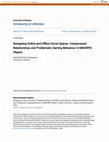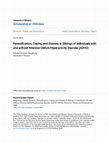Papers by Aranda Wingsiong

I hereby certify that I am the sole author of this thesis and that no part of this thesis has bee... more I hereby certify that I am the sole author of this thesis and that no part of this thesis has been published or submitted for publication. I certify that, to the best of my knowledge, my thesis does not infringe upon anyone's copyright nor violate any proprietary rights and that any ideas, techniques, quotations, or any other material from the work of other people included in my thesis, published or otherwise, are fully acknowledged in accordance with the standard referencing practices. Furthermore, to the extent that I have included copyrighted material that surpasses the bounds of fair dealing within the meaning of the Canada Copyright Act, I certify that I have obtained a written permission from the copyright owner(s) to include such material(s) in my thesis and have included copies of such copyright clearances to my appendix. I declare that this is a true copy of my thesis, including any final revisions, as approved by my thesis committee and the Graduate Studies office, and that this thesis has not been submitted for a higher degree to any other University or Institution.

Parentification is defined as an intergenerational role-reversal within a family wherein the chil... more Parentification is defined as an intergenerational role-reversal within a family wherein the child assumes the role of caregiver for a parent or other family member. Emotionally parentified children may be at greater risk for depressive symptoms and externalizing problems during adolescence (Khafi et al., 2014). Although studies have looked at parentification and subsequent outcomes, few have examined childhood parentification and distress in adulthood. The present study examines the relationship between perceived parentification and unfairness in childhood, and current anxiety in adulthood. The sample consisted of 138 young adults age 19 to 27 years. Participants who reported greater instrumental caregiving, emotional caregiving, and perceived unfairness in childhood also tended to report higher levels of current anxiety. Parentification was not significantly correlated with depression, but those who reported greater perceived unfairness also tended to report greater depression. Contrary to our hypothesis, parentification was not significantly correlated with distress in adulthood for those who identified as being the eldest sibling in the family. Understanding parentification as it relates to anxiety and depression may broaden our knowledge on the long-term impact of childhood experiences, and inform interventions.

Parentification refers to the intergenerational role-reversal within a family wherein a child is ... more Parentification refers to the intergenerational role-reversal within a family wherein a child is assigned the adult caregiving role. Typically-developing siblings of individuals with developmental disabilities often experience increased caregiving responsibilities compared to their peers (Cuskelly & Gunn, 2003) and face unique challenges within their sibling relationship (Petalas et al., 2009), which may place them at a greater risk for parentification. The purpose of the current study was to compare parentification experiences, coping strategies, and social and behavioural adjustment between 30 siblings (age 17 to 25 years) of individuals with Attention-Deficit/Hyperactivity Disorder (ADHD) and 179 siblings of individuals without disabilities. Contrary to predictions, no significant differences in parentification were found between the ADHD and control groups. Higher scores on the parentification variables were associated with distress for the control group, whereas only perceived unfairness was associated with higher levels of distress in the ADHD group. Socially supported coping moderated the relationship between parentification and distress, but only for the control group. ! v! ! ! ACKNOWLEDGEMENTS This thesis would not have been possible without the guidance of my committee members, and the support of my friends and family. I would like to express my gratitude to my advisor, Dr. Kim Babb, for her guidance through this process. I would also like to thank my thesis committee members for their discussion, ideas, and feedback. I am very grateful for my all my wonderful friends who helped me in their own, unique way. Special thanks to my friends back home for tirelessly cheering me on since day one, and freeing up your weekends for me. Thanks to Abi, Jason, Jill, and Natalie-I could not have dreamed of a better cohort and team. Thanks to my loving parents for teaching me to dream big, aim high, believe in myself, and never give up. Thanks to my brother, Aldrich, for always reminding me to strive for excellence, while still having fun. Lastly, this would not be possible without the unfailing love, support, and encouragement of my partner and bestfriend, Will.
International Journal of Psychology, 2016
Autism, 2013
Parents of children diagnosed with autism spectrum disorder often report higher levels of depress... more Parents of children diagnosed with autism spectrum disorder often report higher levels of depression, anxiety, and mental health–related issues. The combination of stressors and family adjustment difficulties can cause distress which may develop into a crisis. Understanding crisis in the family is important to mental health practice since it can serve as a guide in delivering service to at-risk families. This study investigated the subjective experience of crisis in 155 mothers of children diagnosed with autism spectrum disorder. Thematic analysis revealed that crisis is characterized by factors influencing four major areas: demands, internal capabilities, external resources, and subjective appraisal. Understanding what crisis means to families of individuals with autism spectrum disorder can help inform effective preventative and crisis services.
Parents of children diagnosed with autism spectrum disorder often report higher levels of depress... more Parents of children diagnosed with autism spectrum disorder often report higher levels of depression, anxiety, and mental health–related issues. The combination of stressors and family adjustment difficulties can cause distress which may develop into a crisis. Understanding crisis in the family is important to mental health practice since it can serve as a guide in delivering service to at-risk families. This study investigated the subjective experience of crisis in 155 mothers of children diagnosed with autism spectrum disorder. Thematic analysis revealed that crisis is characterized by factors influencing four major areas: demands, internal capabilities, external resources, and subjective appraisal. Understanding what crisis means to families of individuals with autism spectrum disorder can help inform effective preventative and crisis services.









Uploads
Papers by Aranda Wingsiong